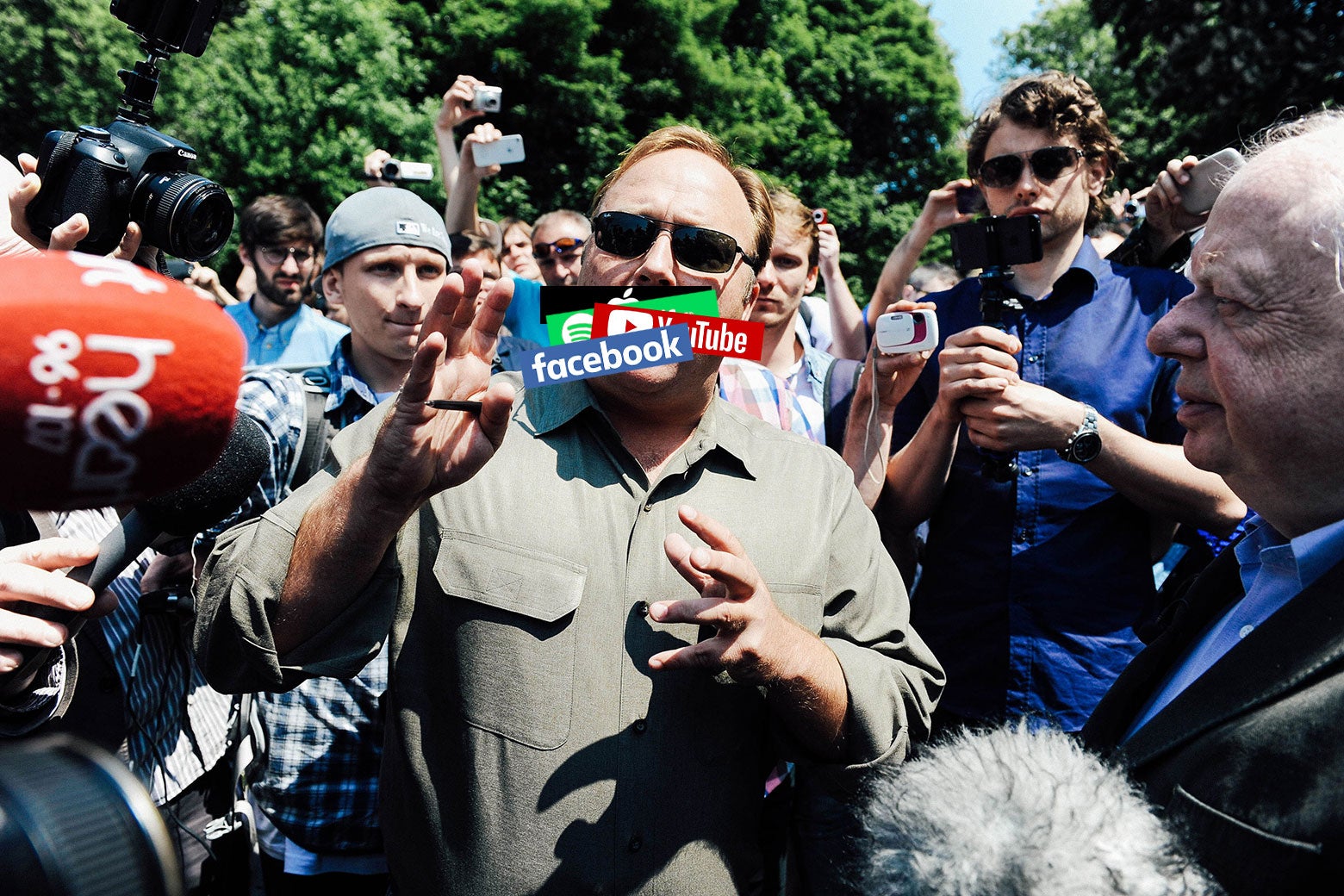Less than a month ago, Facebook was righteously defending the presence on its platform of Alex Jones, the cruel conspiracy-monger behind Infowars. Banning pages such as his would be “contrary to the basic principles of free speech,” the company tweeted on July 12.
On Monday, Facebook changed its mind. It announced in a blog post that it had taken down four of Jones’ Facebook pages. “We believe in giving people a voice, but we also want everyone using Facebook to feel safe,” the company explained in a blog post.
What changed? Not Facebook’s policies on hate speech, bullying, or graphic violence, which the company says Jones violated. And not Jones, who’s been doing essentially the same nasty shtick for years.
No, what changed was Facebook’s interpretation of the policies—an interpretation that appears to have been driven in large part by public perception. In short, Facebook’s reversal has the whiff of a PR move. And maybe, in a weird way, that’s OK.
In a remarkable coincidence (or not), Facebook’s action on Jones came the morning after Apple took down his podcast (and other Infowars podcasts), and the same morning that Spotify did the same. YouTube quickly followed suit, booting the Alex Jones Channel. Things got so bad for Jones by midday Monday that media platforms were practically racing to take down his content before the news cycle moved on. Even YouPorn banned him.
The cascade of crackdowns suggests one of two things. Either Jones was in violation of media platforms’ policies all along, and they never noticed until now; or the platforms moved the goal posts. Neither reflects particularly well on the platforms in terms of the consistency, objectivity, or fairness of their enforcement. Nor does it help that they all seemed to be waiting for one another to make the first move. That’s cowardly.
Jones is already using the crackdown as political fodder, imploring Donald Trump to scrutinize the tech companies’ “censorship” and threaten them with “anti-trust busting” if they don’t back off. There’s an argument to be made that banning Jones plays into his hands, and those of conservative politicians such as Sen. Ted Cruz who accuse social media firms of liberal bias. On the other hand, as my Slate colleague April Glaser points out, the big tech platforms’ dominance is such that Jones is running out of options.
By Tuesday, Twitter was one of the last major platforms where he still had a presence. Twitter executive Vijaya Gadde recently explained the company’s stance in an interview on Slate’s If Then podcast, and a spokesman said Monday that it hasn’t changed. But it wouldn’t be a shock to see Twitter also ban Jones, sooner or later.
Infowars’ banishment was greeted by decent folk across the political spectrum with sighs of “finally.” For Facebook and the other big tech companies, it must come as something of a relief to no longer have to defend the kind of man who attacks the survivors of school shootings. Now that they’ve finally made the obvious right call, we can all move on, right?
Not so fast. Jones won’t go gently into obscurity, and if the likes of Cruz and Trump take up his cause, the fight could get even uglier than it was before. The platforms’ flip-flopping will leave them vulnerable to charges that their policies are arbitrary and their enforcement inconsistent. The veneer of objectivity has cracked.
Right-wing groups will mount pressure campaigns to get them to ban liberal personalities, in the spirit of the recent campaigns against Guardians of the Galaxy director James Gunn and newly hired New York Times editorial board member Sarah Jeong. Gunn was fired by Disney; Jeong apologized and the Times stuck by her. We can expect similar inconsistencies from the tech platforms as they muddle their way through one controversy after the next.
That sounds bad, and it probably will be. But the reality is that the platforms don’t have it all figured out, and never did. They have objective-sounding policies and some processes in place, sure. But deciding who can and cannot speak on social media is not an easy question, and it can’t be answered without difficult trade-offs. Sooner or later, controversies like this one over Jones were inevitable.
The silver lining behind the fracas is that Facebook, Google, and others are finally being forced to reckon with just how hard these questions are. Making decisions based on public pressure isn’t a great look, but it’s better for giant corporations to be responsive to public pressure than for them to be immune to it. Sometimes that will mean that they make cowardly choices that hurt people unfairly. Other times, it will mean that they realize their policies were flawed and improve them.
It’s a messy process, this taking of responsibility for the content on social media platforms. But it’s a necessary one. And it has only just begun.
